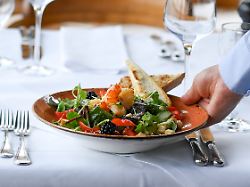updates
“Price shock for the guests”
Hospitality warns of return to higher taxes
09/05/2023 12:54 p.m
listen to the article
This audio version was artificially generated. More Info | send feedback
In January, the VAT rate in the hospitality industry is expected to rise again from 7 to 19 percent. The industry association reiterates its call to keep the tax rate low. Otherwise, the companies would have to pass this on to the guests in full.
Hotels and restaurants in Germany are skeptical about the future and are worried about the expiry of tax breaks at the beginning of 2024. “The existential fears in the industry are undiminished,” said President Guido Zöllick of the industry association DEHOGA (German Hotel and Restaurant Association). “At 45.5 percent, almost half of our companies expect business to be worse than before in the next three months.”
Against the background of falling guest numbers and rising costs at the same time, 28 percent of the companies feared that they would even make losses in 2023. Because of the massive increase in costs, Zöllick again appealed to politicians that the value added tax, which had been reduced to 7 percent, should not be increased again to 19 percent in 2024. “This leads to a price shock for the guests.” DEHOGA has been calling for a long time to keep the VAT on food in the catering trade, which was reduced during the corona and energy crisis, permanently low.
However, the economist and economist Achim Truger is skeptical about the demand in view of the high costs involved. “There is a risk that you will never make the exit and will remain trapped in permanent subsidies,” he told the Düsseldorf “Rheinische Post”. He assumes that an extension of the measure would cost 3.3 billion euros a year. That is “money that would then be missing elsewhere in public budgets and for citizens and companies,” said the economist. Truger also said that he could understand the difficult situation in the catering industry. “On the other hand, private consumption is likely to pick up again over the course of this year and next, which should also benefit the catering trade.”
On the other hand, the economic policy spokesman for the left in the Bundestag, Christian Leye, spoke out in favor of maintaining the lower tax rate. “In addition to the middle class, the small catering businesses in particular are being given a helping hand, which have had to give up a lot in recent years in view of Corona and price explosions,” said Leye of the “Rheinische Post”.
Sales fell in the first half of the year
After several extensions, the tax rate is to rise again from seven to the original 19 percent in January 2024. However, the companies would have to pass this on to the guests in full, as well as other costs, “since the restaurateurs no longer have any leeway and reserves,” warned Zöllick. In the first half of the year, sales – adjusted for changing prices – fell by 10.4 percent in real terms compared to the pre-crisis level of 2019. The nominal proceeds, on the other hand, were almost ten percent higher due to inflation.
According to DEHOGA, the industry lost 36,000 companies in 2020 and 2021 alone. Next year, when the tax relief expires, 12,000 other companies are threatened, said Dehoga in a survey of around 6,500 companies. According to the companies surveyed, the prices for food were on average 25.3 percent higher than in August 2022, for beverages 18.1 percent and for energy products 41.3 percent. Personnel costs also increased by 21.0 percent.
